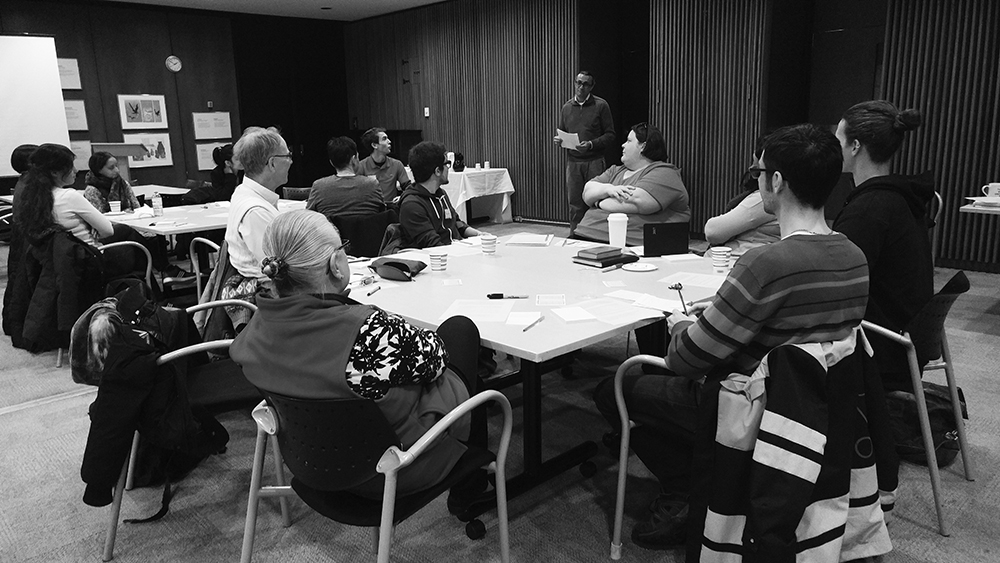Dennis Bayazitov | Contributor
Featured image: The Spirituality, Authenticity, Wholeness, and Self-Renewal in the Academy panel encouraged discussion at the Stong and Calumet Colleges event. | Dennis Bayazitov
Recent discussion hosted by Stong College Master Mazen Hamadeh in collaboration with Calumet College Master Jennine Rawana contemplated and discussed the roles of spirituality and personal values within the contemporary professional workplace.
The event, held on January 12, served as an outlet for reflection on fellow academia members’ experiences of conflict and support in their own professional values and working relationships. The discussion also prompted the attendees to meditate upon their own individualities—to better understand how they could promote a richer connection to the academy as a whole.
“For me, what’s important is when I feel that in the workplace—or in any place I am—my values align with the values of the institution,” says Hamadeh.
“[When this happens,] I feel I am whole. My relationships are whole; my interactions are whole. It reflects in everything I do now. I interact with students on a daily basis, and if I don’t feel whole, they will sense it.”
The Stong College Master emphasized that in the contemporary workplace, values often clash. As such, relationships clash, which only further stunt the collective output of the organization. Without the proper forum for analyzing why such dissidence and ignorance occurs, it is hard to understand which manner of professional conduct works and which does not.
One of the greatest impediments in achieving a holistic, cooperative and authentic professional collective is a lack of communication and understanding. Despite not necessarily agreeing with them, employees often find themselves acquiescing to complete their assignments. As a result, resentment and uncertainty forms, only further hindering working relationships. Such environments promote inauthenticity and a lack of wholeness.
Many of the participants’ own remarks and observations reflected these themes of modern-day professional disconnection.
“Something I’ve struggled with is when I’m unaware of other people’s own certain workplace etiquette […] and trying to incorporate that into how I work,” shared Kamya Kommaraju, a neuroscience PhD candidate.
When asked by Hamadeh how she reacts to such conflict, she said: “Being more open to listening to those that I work with has helped a lot; trying to see their different perspective.”
The participants were handed two major sets of questions that would guide the discussion by triggering their thoughts. The first gauged the context of the most important individual values that we bring into our own workplaces. The second encouraged rumination of conflicts between personal values and dynamics that arise in work environments.
“We live in a way where, for a while, we get by by taking advantage of people not knowing what they’re doing [and] not really asking too many questions,” observed kinesiology alum Eric Barton.
“Now we’re coming to a time where a lot of people like us are coming together and are saying: ‘Let’s all become better individuals and help each other out by educating each other and giving each other outlets like this.’ If we have people [who] are educated themselves, we can create a better whole.”
While facilitating the discussion, Hamadeh encouraged the participants to not only become more aware of such misalignments of values, but also to proactively think of solutions for change.
“York has been a great place to work at. I think you have to find the opportunities to be in a position where you can do that change,” shared Rawana. “You can sit there and complain, but also you can find like-minded people like Mazen and find opportunities to do what you like.”
“Taking lots of initiative [and] responsibility to do it, and finding other people who would enjoy doing it with you,” said Rawana on what she believes to be the best way to enact this change.
One of the key themes of the discussion revolved around the chain of command and following orders. Many of the participants agreed that it’s often difficult to challenge the values of your superior if you disagree with them. Finding yourself in such a situation can be tricky and frustrating, leaving you further disconnected from the culture of the organization.
“Organizations generally have some form of hierarchy—and that has some value—but I think, first and foremost, people have to be seen as human beings first. Whether they’re the president of the university or a first-year student, they have equal importance,” commented Hugh McCague, data analyst and statistical consultant with the Institute for Social Research.
“To really listen to someone, you have to make a sacrifice, to let go of your own needs for a while. So much of our everyday culture is deep with spiritual meaning. ‘To make a sacrifice’ in Latin means ‘to make sacred.’ To really live that out, people will feel a major difference in how they’re being related to. I think humility is extremely important.”
Nearly all of the solutions that were proposed dealt with creating opportunities for more transparent communication and feedback, along with implementing habits that promote better mental health.
One doesn’t have to compromise their authenticity, Hamadeh concluded.
“Build connections. The more connections you build with everyone around you, the more you realize […] how much impact they have on others. If we build that connection, we’ll be able to not only inspire from a distance, we’ll be able to inspire and impact other people’s lives from a very personal aspect.”
Hamadeh intended for students to realize that they are not alone. They are connected one way or another, and have many resources and outlets at York to use if they need to. As an institution, he reinforced that such York events aim to transcend mere academics and to ultimately raise awareness towards wholeness and authenticity within the academy and mould responsible citizens.


